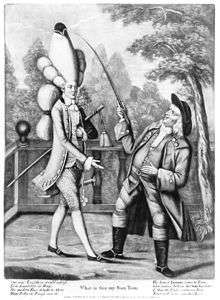Macaroni (fashion)
.jpg)

A macaroni (or formerly maccaroni)[1] in mid-18th-century England was a fashionable fellow who dressed and even spoke in an outlandishly affected and epicene manner. The term pejoratively referred to a man who "exceeded the ordinary bounds of fashion"[2] in terms of clothes, fastidious eating, and gambling. He mixed Continental affectations with his English nature, like a practitioner of macaronic verse (which mixed English and Latin to comic effect), laying himself open to satire:
There is indeed a kind of animal, neither male nor female, a thing of the neuter gender, lately [1770] started up among us. It is called a macaroni. It talks without meaning, it smiles without pleasantry, it eats without appetite, it rides without exercise, it wenches without passion.[3]
The macaronis were precursor to the dandies, who came as a more masculine reaction to the excesses of the macaroni, far from their present connotation of effeminacy.[4]
Origins and etymology
Young men who had been to Italy on the Grand Tour had developed a taste for macaroni, a type of Italian food little known in England then, and so they were said to belong to the Macaroni Club.[5] They would refer to anything that was fashionable or à la mode as "very maccaroni". [6] Horace Walpole wrote to a friend in 1764 of "the Macaroni Club, which is composed of all the traveled young men who wear long curls and spying-glasses". The "club" was not a formal one; the expression was particularly used to characterize fops who dressed in high fashion with tall, powdered wigs with a chapeau bras on top that could only be removed on the point of a sword.
The shop of engravers and printsellers Mary and Matthew Darly in the fashionable West End of London sold their sets of satirical "macaroni" caricature prints, published between 1771 and 1773. The new Darly shop became known as "the Macaroni Print-Shop".[7]
The Italian term maccherone, figuratively meaning "blockhead, fool", was not related to this British usage.[5]
Examples of usage
In 1773, James Boswell was on tour in Scotland with the stout and serious-minded essayist and lexicographer Dr. Samuel Johnson, the least dandified of Londoners. Johnson was awkward in the saddle, and Boswell ribbed him: "You are a delicate Londoner; you are a maccaroni; you can't ride.".[8]
In Oliver Goldsmith's She Stoops to Conquer (1773), a misunderstanding is discovered and young Marlow finds that he has been mistaken; he cries out, "So then, all's out, and I have been damnably imposed on. O, confound my stupid head, I shall be laughed at over the whole town. I shall be stuck up in caricatura in all the print-shops. The Dullissimo Maccaroni. To mistake this house of all others for an inn, and my father's old friend for an innkeeper!"
The song "Yankee Doodle" from the time of the American Revolutionary War mentions a man who "stuck a feather in his hat and called it macaroni." Dr. Richard Shuckburgh was a British surgeon and also the author of the song's lyrics; the joke which he was making was that the Yankees were naive enough to believe that a feather in the hat was a sufficient mark of a macaroni. Whether or not these were alternative lyrics sung in the British army, they were enthusiastically taken up by the Yankees themselves.[9]
See also
Notes
- ↑ OED; Compare fop.
- ↑ The Macaroni and Theatrical Magazine, inaugural issue, 1772, quoted in Amelia Rauser, "Hair, Authenticity, and the Self-Made Macaroni", Eighteenth-Century Studies 38.1 (2004:101-117) (on-line abstract).
- ↑ The Oxford Magazine, 1770, quoted in Joseph Twadell Shipley, The Origins of English Words: A Discursive Dictionary of Indo-European Roots (JHU Press) 1984:143.
- ↑ "Tuxedo Style & Etiquette". The Black Tie Guide. Retrieved 2013-01-10.
- 1 2 "Macaroni". Oxford English Dictionary. Retrieved 2011-01-18.
- ↑ Rauser 2004
- ↑ "Amelia Faye Rauser, "Hair, Authenticity, and the Self-Made Macaroni" ''Eighteenth-Century Studies'' '''38''':1". muse.jhu.edu. doi:10.1353/ecs.2004.0063. Retrieved 2013-01-10.
- ↑ James Boswell, Journal of a Tour to the Hebrides, 1785, chapter 7 available on-line; he liked it well enough to repeat it in his Life of Dr. Johnson.
- ↑ See Yankee Doodle variations and parodies.
References
- Rictor Norton, "The Macaroni Club: Homosexual Scandals in 1772" in Homosexuality in Eighteenth-Century England: A Sourcebook
- The Lewis Walpole Library, Yale: "Preposterous Headdresses and Feathered Ladies: Hair, Wigs, Barbers, and Hairdressers" Exhibition, 2003.